Celebrating the presidency of Kim S. Phipps
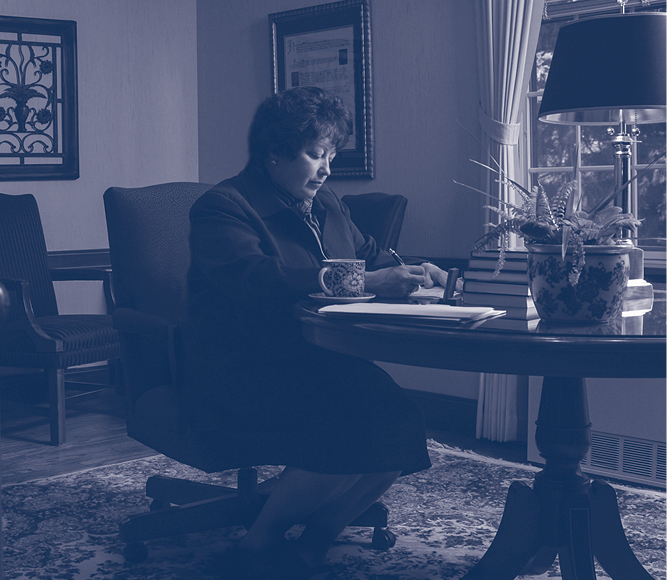 As President Kim Phipps will retire in June, she reflects on her time at Messiah and looks ahead to what the University will accomplish under a new administration.
As President Kim Phipps will retire in June, she reflects on her time at Messiah and looks ahead to what the University will accomplish under a new administration.
You’ve served as president for 20+ years. What do you remember from your first year as president?
It’s a little different for me to describe, because I didn’t just show up as a new person on the first day. I was here as the provost and eased into the new role. As President Sawatsky’s health was declining, the Board of Trustees asked me to serve as the acting chief administrative officer in January of 2004. Then in December, following a national search, they named me as president.
In the fall of 2005, I went through the inauguration. During that celebration, I thought, wow, these are my people. This is the campus community. This is the regional community. This is my family here with me.
When I think back about the biggest takeaways of the past 20 years, I loved the role more than I thought I would. I waited until very late in the search process to apply. I love the classroom, and I love teaching. I’m an educator at heart, so I thought I would do administrative work for a while, but then I would go back to the classroom. Of course, I had the privilege of being the provost and loved working with the faculty and working on ideas related to curriculum and shaping the student experience.
I didn’t know how much I would enjoy the presidency and really had to work through whether that was my calling. It’s a wonderful role, because it allowed me to embrace lots of different communities.
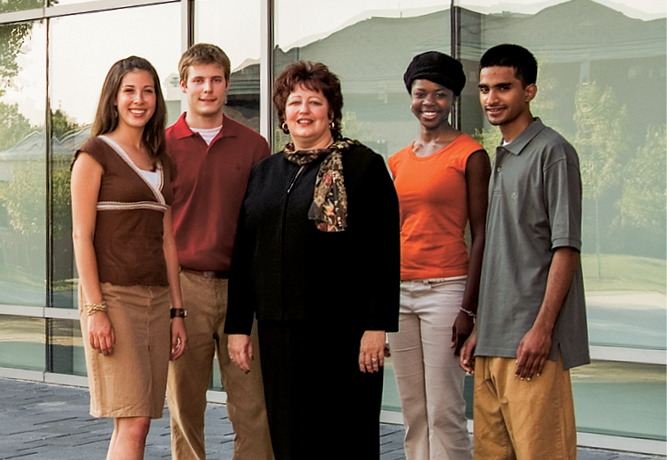 One gift has been getting to know staff. As provost, I knew the faculty and educators, but, because of events and marketing, I got to know other divisions and all kinds of employees. So that expands your world. Your life is really enriched that way.
One gift has been getting to know staff. As provost, I knew the faculty and educators, but, because of events and marketing, I got to know other divisions and all kinds of employees. So that expands your world. Your life is really enriched that way.
Because [my husband] Kelly was involved in a development role at Messiah, I probably had more involvement in development — or we did as a team — than a provost might. That was enhanced, because there’s so much fundraising involved tied to the presidency to really get to know alumni more and donors, to know their stories. We have some remarkable Messiah people in terms of support — their work, their resources, their stories about how they developed their businesses, their desire to give back — lots of stories of courage that really inspired me.
I thoroughly enjoyed the variety that’s the presidency. You might be having coffee with some students and learning their stories and that’s great. The next thing I know, there’s some kind of crisis situation and we’re discussing what’s going to be our institutional response. And then I’m meeting with a donor. There are all different kinds of things happening in a day as president.
The presidency really stretched me and taught me a lot of lessons related to my personal development and my spiritual development. I’m not by my nature a hopeful person, but you can’t lead without some sense of hope to point people toward. We’ve had economic recessions, and we’ve had COVID. Nurturing a theology of hope that’s rooted in really understanding the providence of God has been important to learn and articulate.
I know some presidents start in the fall and are inaugurated in the spring of the same year. I’m really glad it was the following October [months after the death of Rod Sawatsky in December of 2005]. It gave us a chance to grieve and make mental, spiritual and physical space. His wife Lorna and his three daughters, who became cherished friends, attended my inauguration, and I think for them it was also a better space in terms of their own grief journey [to have the inauguration at a later date].
How does your background and training in communications inform your approach to leadership?
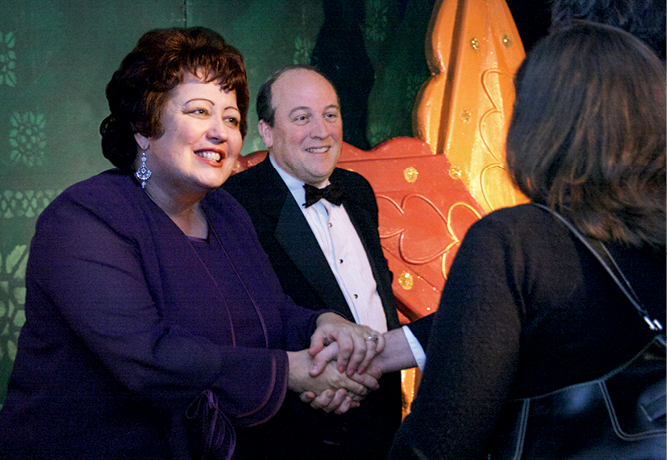 Any leader brings his or her own lens, expertise and experience, and you have to lead from who you are authentically. For me, the study of communication has been really central to my view of leadership, because my view of leadership is very relational. It starts with the embrace of the Imago Dei and the fact that all individuals are created in God’s image, so they are worthy of respect. They are valued. I think about audience all the time as president, whether it’s a letter I’m writing to parents or a community speech to employees or meeting with student leaders. I naturally think about who they are, what they need to hear or what I need to say to them but also what they need to understand. I think it’s "both-and." I know the potential there is for miscommunication and being willing to respond to that, creating space for dialogue, for questions and answers. You work with multiple audiences, and your message has to be sent or shared with each of those audiences. Sometimes, that takes specific language or different approaches. I think about it all the time. My background in communication also then entered into my conceptualizing and articulating, “What does it mean to practice hospitality?”
Any leader brings his or her own lens, expertise and experience, and you have to lead from who you are authentically. For me, the study of communication has been really central to my view of leadership, because my view of leadership is very relational. It starts with the embrace of the Imago Dei and the fact that all individuals are created in God’s image, so they are worthy of respect. They are valued. I think about audience all the time as president, whether it’s a letter I’m writing to parents or a community speech to employees or meeting with student leaders. I naturally think about who they are, what they need to hear or what I need to say to them but also what they need to understand. I think it’s "both-and." I know the potential there is for miscommunication and being willing to respond to that, creating space for dialogue, for questions and answers. You work with multiple audiences, and your message has to be sent or shared with each of those audiences. Sometimes, that takes specific language or different approaches. I think about it all the time. My background in communication also then entered into my conceptualizing and articulating, “What does it mean to practice hospitality?”
I’ve talked before about growing up in New York City and Long Island as a grandchild of immigrants and how my grandparents and my mother created a space for people to come together. As I engaged in leadership and studied more about applied communication, I began to think more about — as Christians and as an academic institution — what does it mean to be a hospitable place? To extend welcome to others, to create a sense of belonging for others, to create the kind of long-lasting relationships that really allow people to learn. That understanding of hospitality also helped me to not only embrace but also to wrestle with reconciliation and the work of reconciliation on campus. I’ve always enjoyed communication, studied communication, and I practice it all the time in my role as president. It was some of that study that naturally led me to themes of hospitality and reconciliation, which I hope are part of how people perceive my presidency or the way my presidency will be defined in the future.
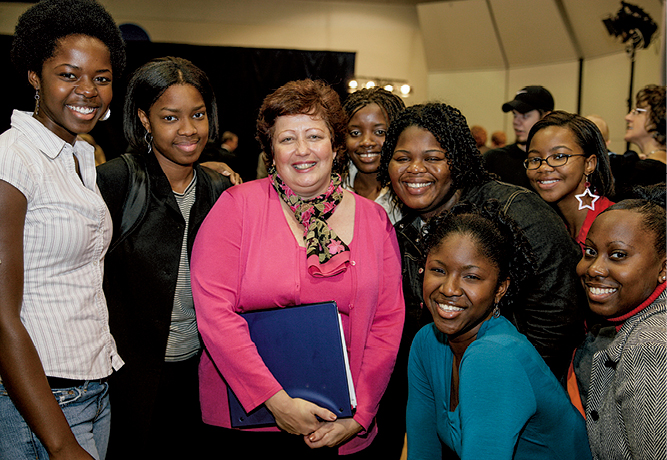 What advice would you have for our community in navigating the challenging national and global issues facing our society?
What advice would you have for our community in navigating the challenging national and global issues facing our society?
In my lifetime having been involved in the study and practice of forensic communications since high school and student government, I’ve never experienced as much division and polarization — in the Church, in the local community, in lots of contexts and associations — as we’re in right now.
People are calling for — and at Messiah we certainly want to be a model for — what starts with fundamental respect of others, not labeling people as enemies in ways that denigrate or dismiss them. Not “othering” people, but really trying to respect individuals and trying to understand, not persuade. That gets to be challenging. Somebody in some context might be representing a Christian perspective with statements that, at least from my humble understanding of Scripture, are just antithetical to what Jesus would say or teach. I have to kind of catch myself and as my daughter Brooke would say, “Mom, you present yourself as Miss Hospitality. I’m not sure that was so hospitable in your response.” How do we really listen to understand? This statement that is so troubling to me — why is this person making it? What’s gone on in that person’s life — their journey? What’s brought that person to this place? As a nation, if we’re going to be able to do anything to be more unified and to move forward, it requires respect for others and listening to understand. Listening requires humility, which I think we’re lacking in society. For the Church, our witness has really been hurt or diminished by a sense of being connected to politics in such extreme ways. I’m hoping that — and this is always my hope when we send out Messiah students and graduates — that they understand the importance of Micah 6:8 acting justly and walking humbly with our God, extending mercy. That’s a part of who they are and who they need to be. I’m hopeful that we can move forward as a nation in that way.
What do you say to the growing public sentiment that a college education has become cost prohibitive?
There’s certainly truth to the statement that college is too expensive. I don’t think we can deny that fact. There are different drivers for that reason — technology, which we can’t function without, and its escalating costs and governmental expectations on compliance and reporting, which require human, structural and financial capital. Education is person-centered, and you have to take care of your employees who are delivering your core mission to students. There are always rising health insurance costs. Research continues to demonstrate that an individual’s ability to earn more is enhanced by having a college degree. Some students wait [to go to college] and get a job at Sheetz or Wawa for what seems to be good hourly rate, but they’re not looking 5, 10, 15 years down the road. Another factor that people forget is how hard colleges and universities are working at maintaining and cutting costs. I look at what we’ve done here at Messiah. We did a major prioritization process to reduce $6 million from our operating costs. We also have repeatedly examined our annual budget to look for ways to manage $1-2 million in reductions and insure that we still are competitive in caring for our employees and keeping tuition increases less than 3 percent.
The other piece people don’t realize with the U.S. government is how little has been added to student work-study and to student loans over the past two decades. While cost has been increasing, government and state support has been decreasing.
We also work at raising money to help support the student experience. It’s roughly 99% of students at Messiah who receive scholarships and financial aid. Anytime people with means who really love Messiah want to give back, I’m always humbled by that, their desire to invest in people that they think will be servants and leaders and reconcilers. I’m grateful we have a strong financial aid program that we can help students who want a Messiah education. We couldn’t do that without generous benefactors who make that happen.
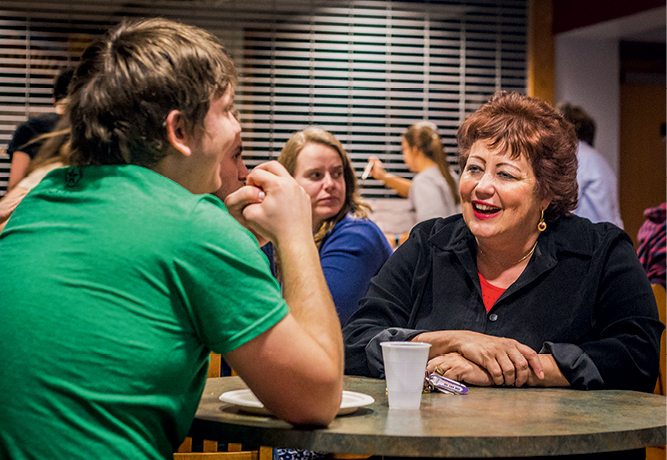 Looking back over your decades at Messiah, what are some of the most significant changes or accomplishments you are most proud of during your time as President?
Looking back over your decades at Messiah, what are some of the most significant changes or accomplishments you are most proud of during your time as President?
It’s always the accomplishment of teams. You could never do anything by yourself as a president, so you always need to acknowledge your administration, faculty, staff, Board of Trustees, the team in your office. I have worked with really great people, and my successor is going to be very fortunate to work with a lot of those same people.
Our campus community has embraced values of hospitality and reconciliation. There are times we have hard conversations. We have to work through tough things. We’re not perfect, but we know we’re on that journey together.
There have been lots of physical transformations on campus. We’ve been able to raise about $180 million over time. A lot of that has been related to our physical facilities. I was just at a Mendelssohn Piano Trio concert in Parmer Hall in the High Center and got emotional remembering how much we wanted to see that building built. I’m so thankful for folks like the Highs and the Parmers who helped make that a reality for us. That’s been wonderful not only for our students but also our broader community. It really has made a statement in the region about how we want to be connected with the external community.
I love the renovation we did in the library, because it didn’t touch the stacks. I love the view that’s always been there of the stacks. It’s great to enjoy Martin Dining Commons or to go over to Boyer Hall. Go to a concert at the Union. Watch the swim team. What’s most important are the people in the buildings and I absolutely know that, but you do need certain kinds of capital projects and equipment to accomplish a purpose. The legacy and the transformation of the campus would be a big part of it. Adding the graduate school — that was something there was some resistance to. But one of the roles of a president is to be looking out ahead. I was looking at the demographics and saying we have got to have another audience, another population. We found the psychology department had a desire to do a counseling program. So that was the first program we launched. We didn’t say we were going to have a graduate school, but we did say we’re going to have this. We have educated many wonderful men and women who are out there helping with the plethora of mental health needs in our society. And then we added a program after that. And people were more innovative on campus. When the music department came with their idea of a conducting program online, I thought that’s the craziest thing I’ve ever heard. How will you do that? That’s continued to be such a wonderful program. It’s done with quality and excellence. And there’s our building at Winding Hill and seeing graduate students being present there. All of that happened with so many people working together. Part of what a president has to do is cast a vision and then work with people to help them find the resources and then support them to make things happen.
What has been the most unexpected aspect of being a university president?
An unexpected piece that was good was how much I’ve been able to connect with students. When I was serving as provost, I felt more disconnected from students than when I was a faculty member. I was afraid that as a president I would be even more removed. But not only have I sought lots of different connection points, students seek me out. I get the email, “KP, would you be willing to come to dinner at our apartment? We’d just like to host you.” I treasure that. Students are the reason we exist. I love spending time with students, and I think they help me tell the Messiah story better. I think of myself as chief storyteller. You have to know what’s happening in students’ lives to tell those stories.
The unexpected part of the presidency for me was how relentless the pace would be. As the president, you are thinking about everything — every area of the university. In a time when there are more potential challenges and crises than ever before, it’s very difficult to shut off your mind. When I think about retirement, that’s one of the things I look forward to: not worrying or being so focused on enrollment numbers and giving numbers and have we filed the reports we need to, all those things that just come from leading. I felt like I had been a senior leader and I had been a provost but as the president you do think about all of it.
In what ways have students influenced your decisions or the direction of Messiah, and how important do you believe the student perspective is for the university’s future?
Students have really influenced me in two areas:
One is sustainability. Students challenged me about our practices on campus that made me realize it was really an aspect of stewardship. If we talk about what it means to be a Christ-centered educational institution, loving and caring for God’s creation — people and the physical world.
Also, it was a student who helped me understand that hospitality has to lead to belonging. The student said to me, “Hospitality is not enough” — as they were understanding the terminology — “we want to belong. This is our place, too. You feel like you’re welcoming me? Well, I want to welcome you.” We had these interesting conversations. What does it mean for everyone here to experience a sense that this is my place? Now I’m much more conscious of talking about belonging because of students. Students have certainly been my teachers.
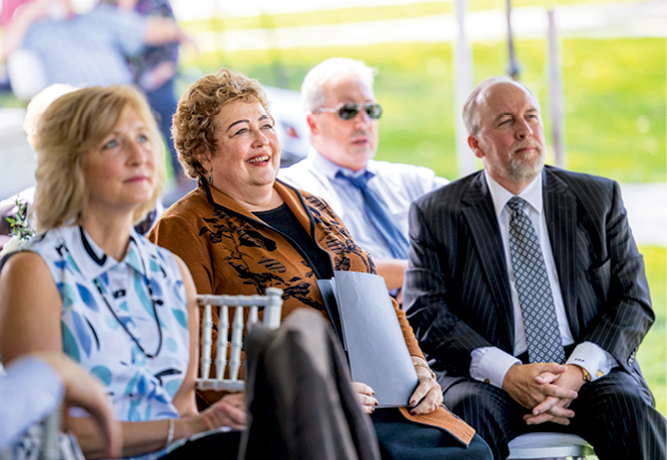 Where have you looked to find sources of support during your presidency?
Where have you looked to find sources of support during your presidency?
The Board. I am very aware that I have an exceptional Board of Trustees. I have always experienced their support. I have always had board chairs who I could call and say, “Here’s a situation that has come up. This is how I’m thinking of addressing it. What do you think?” They have been wonderful human beings who generously have provided advice; counsel; and financial and prayer support.
My husband. Having a spouse who not only understood but really wanted to help me be the best president I could be, who cared deeply about Messiah, who had the kind of sense of humor that when I’m taking myself too seriously, he could help me put things into perspective. He put aside his own professional goals to fully support me and serve Messiah. My daughter, my brothers. I’ve had a close family network of support. Also, I have felt very supported by the Messiah community. A lot of people in their vocational lives may never receive expressions of thanks and affirmation. It’s something to treasure and not take for granted.
How has serving as Messiah’s president shaped you?
As president, there are lessons you learn about leadership, about making hard decisions, about how you communicate those decisions. I learned more about budget and finances than I ever wanted to, but it’s really important because you can’t fulfill the mission without the necessary resources.
I struggled early on in the presidency with imposter syndrome. I did not see myself as president. I saw myself as a teacher since I was 5 years old. I’d make my brothers sit, and I’d teach them. I didn’t necessarily see myself in this role [as president] and then worry, am I enough? Working through that to lead well and not to allow your doubts to overwhelm you so much is a process. It doesn’t happen overnight. Look for signs of affirmation, such as being reviewed by the board or receiving community feedback. Trust evidence that you are being effective.
As you prepare to retire, what legacy do you hope to leave behind? What would you like to see continued or further developed by your successor?
Messiah’s mission as a Christ-centered institution is first and foremost. Our commitment to hospitality and reconciliation coming out of our faith commitment is part of my legacy.
What I look forward to most with my successor is being a wonderful source of support to him/her. I see myself as someone who will make encouraging phone calls to my successor and be a sincere champion for how he or she attempts to lead the university. It will be exciting to see where and how Messiah fulfills its mission by a new leader.
What challenges are ahead for the University and its next leader?
In a time when we’ve hit the undergraduate demographic cliff, we are continuing to work at enrollment while managing our financial resources well. We have a campus that’s cooperative and works together to accomplish goals. We have very good financial leadership at Messiah, but that challenge will continue to exist.
Another challenge is the current generation of high school students and some of their disaffection with the church — not with Jesus — but with the institutional church. It raises questions for Christian colleges and universities about how they will connect with those young people and how our requirements and guidelines are going to be received. A new president will quickly need to make a strong case for a college or university education but also for a Messiah education specifically.
And the new president will need to be prepared for any kind of disaster. When we prepared the pandemic plan, I remember thinking, well, we won’t use that. Well, in 2020, we did, and we have a much better pandemic plan now that we’ve gone through one. Lesson learned.
I always say there’s plenty to keep you awake at night, but there’s plenty to make you want to get up in the morning. That will be true for my successor, too.
What will retirement look for you?
Kelly and I are going to live in Lancaster, and I look forward to being a part of that community. We both have identified volunteer assignments we want to be involved in. I’m going to be working with a nonprofit that hires college interns, just to be a mentor and to help with leadership development. I want to also help with refugee resettlement. (The Lancaster area resettles many refugees through Church World Service and Mennonite Central Committee.) Also, I recently joined the Board of Lancaster Mennonite Schools. Our daughter graduated from the high school, and I have a deep appreciation for the school.
I’m looking forward to being in a book club. I’ve always wanted to be in a book club.
Kelly and I look forward to a more relaxed schedule, to spend more time with family, certainly more time with our daughter who lives on the West Coast and is a professor. Life is meant to be lived with purpose and meaning, so it’s important for us to know we have identified how to engage in work that matters.
I’ve been grateful every day. It really has been an honor and a privilege.
Sidebar:
Phipps Family Scholarship
Kelly and Kim Phipps have spent their lives devoted to students and to Christian higher education. Kelly, when he served as the director of development, led one of the most successful fundraising campaigns in the history of Messiah. After serving as provost, Kim was selected unanimously by the Board of Trustees to lead Messiah in a difficult time of transition. In the two decades since she became the president of Messiah, she and Kelly have had a transformative influence on Messiah. They also have demonstrated exemplary service to local, regional and national communities through their advocacy for Alzheimer’s awareness, the arts, higher education and community support services. Their impact on Messiah is profound and lasting. It seems only fitting that their daughter, Brooke, has chosen the vocation of teaching and scholarship. She will no doubt continue the Phipps’ legacy of commitment to students, to learning and to God’s world. They established the Phipps Family Endowed Scholarship to benefit students who demonstrate financial need and are in good academic standing.
Sidebar:
An interview with 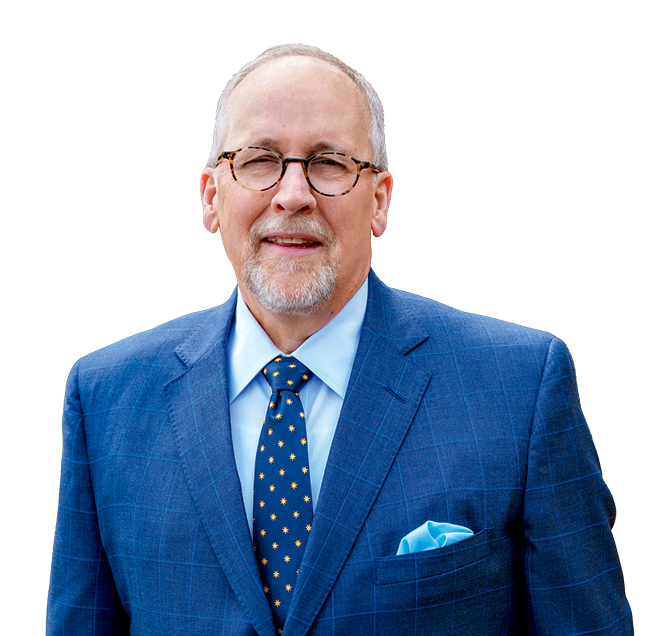 , the First Gentleman
, the First Gentleman
While most people on campus recognize President Kim Phipps, they might be less familiar with her husband, First Gentleman Kelly Phipps. Their love story began at Kentucky Christian University, where they were both undergraduates. More degrees for both of them soon followed.
“We decided to put Kim through her Ph.D. She wanted to go to Kent State and study under a certain professor. I got a job as a youth director of a church, which was going to be a temporary thing until I went to law school, and I ended up becoming the senior minister of the church,” he said.
Eventually, he attended the University of Akron to pursue a law degree — and a master’s.
“It was the only school in the nation at the time that offered a master’s degree in campaign management. When I got into that program, they wanted to know if I would think about going to law school, as well. I was trying to do a joint M.A.-J.D. I said sure. Then I got into law school and it got so overwhelming, I had to drop the M.A. program,” he said.
He still worked on political campaigns while practicing law, writing speeches and working for a state senator. Meanwhile, President Phipps — who was then known as Dr. Phipps — worked as dean of the faculty at Malone College.
“She always said she would move from Malone for only two colleges — Eastern University or Messiah,” he said. “She came in one day and said, ‘They want to talk to me at Messiah.’”
They visited, and the first time wasn’t a charm. A couple years later, they visited again. She became academic dean at Messiah in 1998.
“I didn’t come with her. I moved her and my daughter Brooke over here. We bought a home here, and I stayed in Ohio with my career. I was teaching. I was doing politics, and I had a job as a general counsel for a healthcare facility,” he explained.
Then Barry Goodling, Messiah vice president of advancement, visited and offered Mr. Phipps the opportunity to be the director of development in 1999.
“That was something new. That was challenging. I had been doing political fundraising, so I said, ‘Let’s give it a try.’ The development department was small. President Sawatsky had a big campaign in mind. Messiah had never done anything like that before, I said, ‘Mr. President, you don’t have the horses to draw this wagon. We’re going to have to build this department.’ We went from about six people to 23 people. And we raised $50 million.”
By the time the campaign ended, he stepped down as the director because it would have been a conflict of interest once Kim Phipps became president.
“I started my own law firm. I was able to practice law here in PA sponsored by Ron Katzman, a trustee of the college. I specialized in higher education law and worked with presidents of colleges that were in trouble,” he said. “I tried to be involved in the campus. I taught business law here for 10 years as an adjunct. I’ve chaired campaigns. I just tried to help wherever I could. The main goal was to help her in her presidency.”
Then another opportunity presented itself.
“The chair of the finance committee of the Board of Trustees came to me at my law office and said, ‘We have this big tract of land across from the university that we need to do something with, and we’ve been meeting in a committee for about 12 years trying to figure out what to do with it.’ He just handed me a big file and said, ‘Do something with it.’”
Since the project was so large, he gave up his law practice and formed the for-profit corporation, Rider-Musser Development, to build apartments and the roundabout at the entrance of campus. After spending several years on the project, he decided to retire in 2022 — while volunteering in the pre-law advising program at Messiah.
When President Phipps retires this summer, they’ll make their home in Lancaster. After wearing many hats, he says he wants to be remembered in one way.
“This guy just did everything he could to help make his wife be a successful president. That’s what I did. It was not what I had envisioned for my life in terms of being a support role, but that’s fine. This has been a great place. The students every day remind you that this was a worthwhile place to spend your life,” he said.